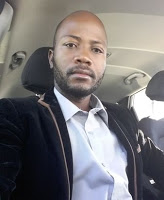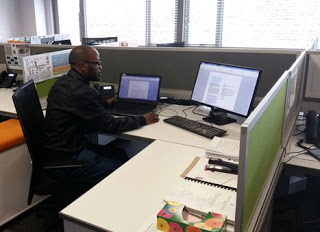I am Quinex Chiluwe and This is How I Work
 Today, I am inviting Quinex W. Chiluw to the “How I Work” series. Quinex is PhD candidate at University of Pretoria and Agriculture Engineer at AECOM SA Ltd in Pretoria, South Africa. His research is focused on building resilience of water security as social-ecological system in a river basin context. His research interests include water governance and policy, institutional analysis, social-ecological systems analysis, and water policy.
Today, I am inviting Quinex W. Chiluw to the “How I Work” series. Quinex is PhD candidate at University of Pretoria and Agriculture Engineer at AECOM SA Ltd in Pretoria, South Africa. His research is focused on building resilience of water security as social-ecological system in a river basin context. His research interests include water governance and policy, institutional analysis, social-ecological systems analysis, and water policy.
Quinex graduated from the University of Malawi in 2007 with a Bachelor of Science in Irrigation Engineering. Upon graduating, he worked both in the private as well as public sector. He worked within the Ministry of Irrigation and Water Development coordinating water users associations at local water management level and irrigation design in a World Bank funded project. Shortly after that, Quinex joined Self Help Africa, an international non-governmental organisation with a specific focus on integrated rural development. Here, he led and participated in the development of various community-based natural resources management programs, irrigation development, climate change resilience interventions, and water, sanitation and hygiene (WASH). The experiences above ignited some passion for water resources management and Quinex eventually pursued and graduated with a Master’s degree in Integrated Water Management at Monash University in 2014.
Current Job: Agriculture Engineer
Current Location: AECOM, Water Governance and Planning, Pretoria, South Africa
Current mobile device: Samsung Android Device
Current computer: Acer Aspire E15
Can you briefly explain your current situation and research to us?
I am a busy person with three responsibilities – husband and father, employee and student.
Firstly, let me say that I am husband to my wife and together we have two lovely daughters (one is six and the other one is 4 years old). I work as an Agricultural Engineer at a busy Engineering Consulting firm – AECOM in South Africa. The company I work for has a very diverse work stream and therefore teams. Although the title of my position is Agricultural Engineer, I normally do work within the water governance space.
I started my career as an Irrigation Engineer in Malawi where I am originally from after graduating from the University of Malawi with a BSc Irrigation Engineering degree in the year 2007. After working for a couple of years both in government and private sector, I became interested in pursuing further studies in water resources Management. By then, my main interest was to further my understanding on how water can be shared amongst farmers in the wake of the impending climate change in a river basin. I thus attended Monash University at its South African campus for an MPhil degree in Integrated Water Management.
Upon finishing my studies early 2014, I became interested in doing a PhD in the same field. Before starting the PhD studies, I was offered a job at my current workplace and decided that I would do my studies part time.
So I eventually started my PhD in January 2015 on part time basis at the University of Pretoria, in the Faculty of Agriculture and Natural Sciences while keeping my full time job. I am currently continuing with my passion to understand water sharing in a river basin – but now building on systems thinking and social-ecological system theories applying them on water security.
What tools, apps and software are essential to your workflow?
I am not sure if I have specific tools that I carry with me, but there are a few things that I think make part of my life. On computer applications, I use Endnote as my referencing software. I am not an advanced user though, would love to learn some more tricks. I have tried Zotero and Evernote – both incredible apps but I didn’t want to use too many apps. So I had to stick to Endnote and MS office.
I would be doing some injustice if I don’t mention my cup of coffee (and accessories) as these keep me awake when I become an owl.
And of course, I am still old school. So I carry with me a hardcover notebook where I write any new thoughts in whichever form they come. This notebook contains my unstructured thoughts some of which I find very useless but later become so useful.
Finally, there is a small calendar app on my Android device where I keep my entire to-do list. It synchronises all my daily work and study routines and helps me manage my time better.
What does your workspace setup look like?
I obviously have three workspaces – one at the office, a tiny one at school and another even more tiny one at home. So I normally try to separate my life. I make sure I do what my job demands of me at office workspace – then I go to school after 16hrs (luckily, a 15km distance from my office) except some family days and weekends where I use my home workspace.
What is your best advice for productive academic work?
Wow, on this one I am not sure. I have been looking for one myself. Any advice from seasoned academicians and fellow strugglers like me would be welcome.
How do you keep an overview of projects and tasks?
So, certainly I am not the best planner. But I normally keep my planning horizons short because of the nature of my short academic days. My academic day starts at 17hrs CAT and I need to ensure that I use it wisely.
Besides phone and computer, do you use other technological tools in work and daily life?
I have a simple Tablet, but my computer and my phone are my basic instruments.
Which skill makes you stand out as an academic?
So far, I have not yet established myself as an academic. I hope to be one someday. But I can say that networking has been key to my journey as a PhD student. I have made important networks that have kept me afloat when I feel like giving up.
What do you listen to when you work?
I must say that I work better in a place where there is consistent noise which is not linked to visuals. As such, I normally (almost every time) plug in to music in my ears. Sometimes I listen to fast music or slow music depending on the level of anxiety.
What are you currently reading? How do you find time for reading?
This, I think is a difficult question. I previously used to say reading is one of my hobbies – I am sorry it is no longer. I can’t remember when last I read something as a hobby rather than obligation. So I have a number of books that I have just started but cannot find the time to actually finish them. Other books are part of my research while some are just out of mere interest. The following books have been on the must complete list for quite some time;
- David and Goliath: Underdogs, Misfits, and the Art of Battling Giants
- Thinking in Systems
- The Art of Systems Thinking: Essential skills for Creativity and Problem Solving
- Complexity: A guided Tour
- The War Room
Are you more of an introvert or extrovert? How does this influence your working habits?
I am an extrovert and this has assisted me to network much easily at the school faculty and library especially being a part time student.
What’s your sleep routine like?
I am not good with working up early in the morning. So I make sure that whatever work I have is done before going to bed. I normally maintain an average sleeping time of 5 to 6.5 hours every day. I wake up at 6am so that I can take my daughters to school before I get to work.
What’s your work routine like?
My work routine is a little bit tight. I start work at 8am and knock off at 4pm. I then drive to school where I do study until 9pm on Mondays, Tuesdays and Thursdays. Wednesdays and Friday are family days – so I go straight home from work and play with my kids and watch a movie with my wife from 6 to around 8pm. I then start my studies until 23:30pm. I work on studies full time on Saturdays and Sunday is family day. I should mention though that sometimes this schedule does not work.
What’s the best advice you ever received?
I have indeed received a number of advices regarding doing a PhD. But one that I think has helped me quite a lot is “to learn to say no to some stuff”. Whether at work or at the faculty, people would want you help with something or short term assignments. People will be hurt when you have not helped out, but by looking at the time I have – no is a good answer. It clears my desk and creates time to work on most important and pressing things.

